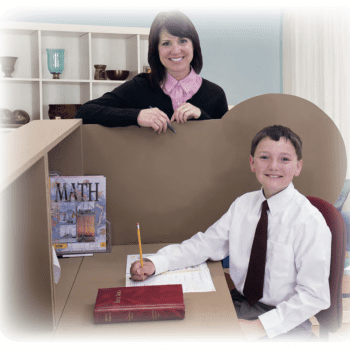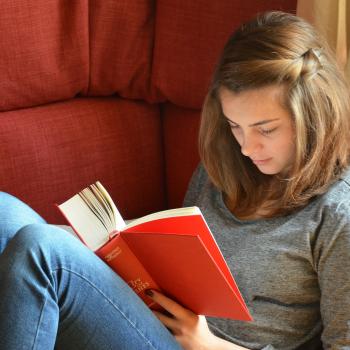The September 2015 cover of Boston Magazine features a smiling young woman wearing a Harvard University sweater with the caption “Homeschool got me into Harvard” in front of her. As a homeschool graduate myself, this cover caught my eye. As I looked at it, I puzzled over its intent. Homeschool graduates have been attending Harvard for decades now, so it’s not exactly news that a homeschooler was admitted. Yet homeschool graduates make up far less than 1% of the students at Harvard, despite the fact that as of 2011, 3.4% of students were homeschooled.
I read through Samburg’s article, which focuses on Harvard-bound homeschool graduate Claire Dickson and includes interviews with other homeschooling families, to determine whether it mentions just how unusual Claire’s case is. In answer, I found this paragraph:
And what about Milva McDonald’s daughter, Claire, who’s headed to Harvard? Is that a one-in-a-million shot, or have McDonald and her allies discovered a new path to the Ivy League—one that runs right through their living room? To find out what elite academic institutions think, I call Matt McGann, director of admissions at MIT. He’s entirely optimistic: “The homeschooled students in our population are a great addition to the MIT community. They are students who are more likely to have designed their own education curriculum, and they may be more independently motivated to learn,” he says. “I think as the nature of homeschooling has evolved, colleges are seeing more and more homeschooling applicants who are appropriate for this environment.”
Samburg could have contacted Harvard to ask for their admission statistics, or simply looked online for their annual class profiles, but she didn’t. As a result, her article masks the reality that homeschool graduates are severely underrepresented at Harvard and other Ivy League schools. She quotes the director of admissions at MIT saying positive things about homeschool graduates, but she does not note that only 1% of students entering MIT this fall are homeschool graduates. She also never mentions that only 0.3% of the 2014 freshman class at Harvard were homeschool graduates.
Why does this matter, you may wonder? It matters because articles like this mask the dark underside of homeschooling and present an overly rosy picture of the practice. Yes, it is true that children can benefit from homeschooling, and that absolutely should be talked about. In some cases, homeschooling can allow children to pursue their educational interests in innovative ways and engage in learning that would be impossible in a formal school setting. It can also offer students struggling with bullying or a school structure that does not fit them a safe space and the room they need to express themselves as individuals.
But homeschooling, by itself, does not get a child into Harvard. Samburg writes that Claire Dickson was involved in a theater group, a creative writing club, and a math group, and that she took “supplementary classes at the Harvard Extension School and Bunker Hill Community College.” In a blog post, Claire’s mother writes more about her approach: they are unschoolers who place a priority on supporting their children’s interests and finding resources to facilitate their learning. They worked hard—very hard—to get Claire where she is today, and while Claire’s mother insists on her blog that Claire got herself into college, Claire could not have done that without the resources and rich educational environment her mother provided her.
I know this because I know homeschool graduates who did not have these resources or this environment, and their stories are far, far different from Claire’s. Alumni-run organizations like Homeschool Alumni Reaching Out (HARO) and the Coalition for Responsible Home Education (CRHE) point to cases of homeschool failure and urge communities to do better by the homeschooled children in their midst. HARO focuses on child abuse awareness and prevention and on providing community and support for graduates of bad homeschool environments while CRHE focuses on providing information on homeschooling and advocating for more effective oversight.
HARO and CRHE point to the reality that homeschooling fails some children colossally. This is because homeschooling is only as good as the parents it relies on, and the resources those parents have to offer. In the hands of parents like Claire’s, homeschooling can be a powerful tool promoting children’s wellbeing. In the hands of parents who lack the resources or knowledge to provide an education, on the other hand, homeschooling can leave children with severe educational deficiencies. And in the hands of controlling or abusive parents, well, the story may be far, far worse.
In a recent Slate article, Jessica Huseman noted the following:
If social workers are particularly interested in home-schooling families, it’s not because they assume those parents are predisposed to be abusive, said Barbara Knox, a University of Wisconsin pediatrician who specializes in child abuse. It’s because parents who do have a pattern of abuse often pull their children from school under the guise of home schooling in order to avoid scrutiny. A 2014 study conducted by Knox and five colleagues looked at 38 cases of severe child abuse and found that nearly 50 percent of parents had either removed their children from public school or never enrolled them, telling their respective states they were home schooling.
“This is a pattern all of us see over and over and over again,” Knox said. “Certainly there are wonderful home-schooling families. But the lack of regulation for this population makes it easier to disenroll children from public school to further isolate them and escalate abuse to the point of reaching torture.”
Homeschooling is not a magic bullet. Homeschooling is an educational method that places a great deal of power in the hands of a child’s parents, nothing more, nothing less. In the hands of well educated parents with access to resources, the result can be extremely positive. In the hands of parents too overwhelmed trying to provide for a large family to pay much attention to academics, the results can be devastating. And in the hands of abusive parents? In the hands of abusive parents the results are sometimes so tragic they are difficult to read.
I am all for telling positive stories of homeschooling, and I am by no means saying that Samburg’s article should not have been written. But to write it without noting that homeschooled children are far less likely to attend a school like Harvard than students educated via other methods is misleading and, frankly, irresponsible. Any article spotlighting a homeschooled student’s admission to an Ivy League school should at least note that homeschooled students are much less likely than other students to attend places like Harvard or MIT, and, ideally, also ask why this is and whether it is a problem here that needs addressing.
Please, media, I’m asking you as a homeschool graduate—get this right.














